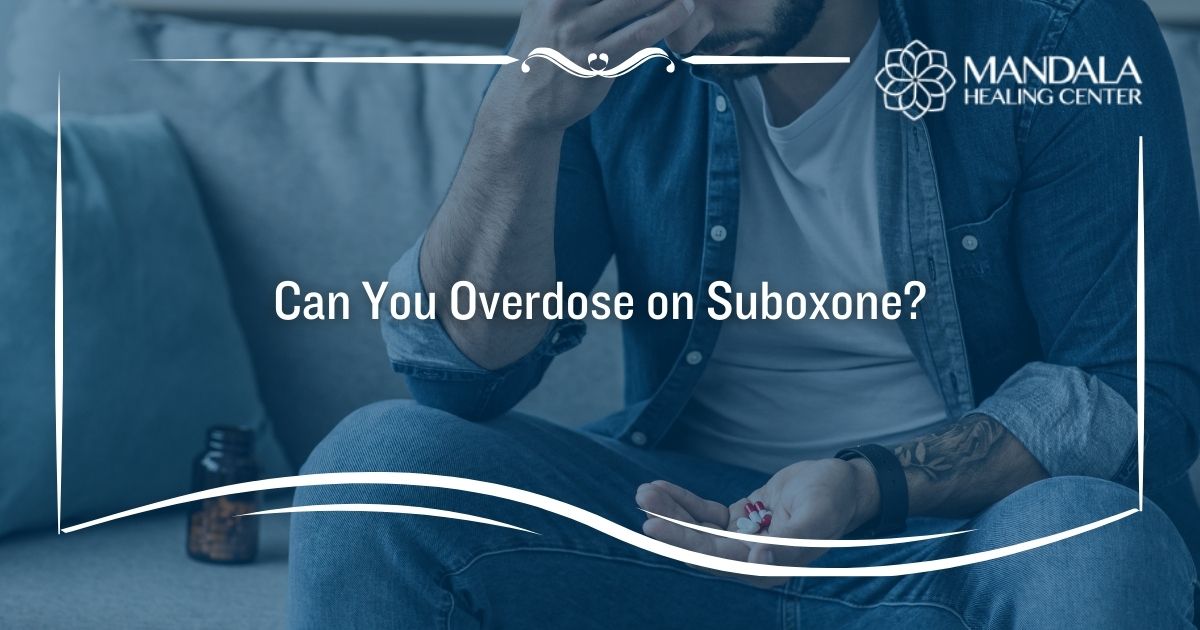Opioid addiction is a common problem in the United States, and opioids are a leading cause of drug overdose among people of all ages. According to the National Institute of Drug Abuse (NIDA), opioids were responsible for 80,411 overdoses in 2021.[1]
Because opioid addiction often leads to fatal overdoses, addiction treatment experts decided to create a more aggressive form of treatment. Known as medication-assisted treatment (MAT), this type of opioid recovery program combines traditional addiction treatment with the use of FDA-approved medications to prevent withdrawal symptoms and cravings.
While MAT has proven extremely effective for people with opioid use disorders, some individuals may abuse the medications used in these programs. One of those medications is known as Suboxone.
When taken as prescribed, Suboxone is safe and effective. But when abused, Suboxone comes with a number of risks, including the potential for overdose when high doses have been taken.
What is Suboxone?
Suboxone is the brand name for an FDA-approved medication used to treat opioid use disorder that combines buprenorphine and naloxone.
Buprenorphine is a partial opioid agonist, meaning it binds to opioid receptors in your brain to make it believe it’s receiving the opioids it craves.[2] On the other hand, naloxone is an opioid antagonist, meaning it blocks other opioids from binding to your opioid receptors to cause mind-altering effects.[3]
By combining buprenorphine and naloxone, Suboxone can prevent people from experiencing withdrawal symptoms and cravings while ensuring they do not relapse during addiction treatment.
The side effects of Suboxone include:[4]
- Headaches
- Stomach aches or pain
- Constipation
- Difficulty sleeping
- Mouth numbness or redness
- Tongue pain
- Blurry vision
- Backaches or pain
Can You Overdose on Suboxone?
The naloxone inside of Suboxone is there to ensure that people receiving medication-assisted treatment cannot relapse on other substances. Additionally, naloxone is used as a stand-alone medication to reverse opioid overdoses. However, this does not mean that you cannot overdose on Suboxone.
People taking Suboxone to treat opioid use disorder already have a high tolerance for opioids. This is because before taking Suboxone, their bodies were dependent on stronger opioids like heroin, oxycodone, or others. As a result, these individuals will not experience mind-altering effects from Suboxone, making it extremely unlikely they will abuse large enough amounts to experience an overdose.
If you have a low tolerance for opioids and begin abusing Suboxone in high doses, you could experience an overdose. Even further, combining Suboxone with other substances can increase your risk of suffering from an overdose.
Substances That Make a Suboxone Overdose More Likely
Every substance you take has interactions with other drugs. Some interactions are mild, while others can lead to life-threatening effects. If you combine Suboxone with certain substances, your risk of overdosing increases.
The substances that can increase your risk of a Suboxone overdose include:[5]
- Antidepressants
- Alcohol
- Benzodiazepines
- Cocaine
- Barbiturates
- Methamphetamine
- Phencyclidine (PCP)
- Ketamine
- Opioids
- Dextromethorphan
- Synthetic cannabinoids like K2 or spice
- Phenobarbital
If you mix Suboxone with another central nervous system depressant, the activity in your brain can be slowed to dangerous levels. As a result, you could experience a life-threatening overdose.
Symptoms of a Suboxone Overdose
If you or a loved one abuse Suboxone, being aware of the signs of overdose can help you seek emergency medical services sooner rather than later.
The symptoms of a Suboxone overdose include:
- Confusion
- Blurry vision
- Faintness
- Trouble thinking clearly
- Memory issues
- Extreme drowsiness
- Impaired coordination
- Slurred speech
- Stopped or slowed breathing
- Fading in and out of consciousness
- Becoming unconscious or unresponsive to stimuli
Treating a Suboxone overdose can be a bit complicated because it already contains the opioid overdose reversal drug naloxone. It is important to note that administering a dose of naloxone can momentarily stop a Suboxone overdose, however, the individual might experience precipitated withdrawal. Not only that, but buprenorphine can last longer than naloxone, so when the naloxone wears off, an overdose can happen again. As a result, 911 should be contacted immediately so they can receive prompt emergency medical care and hospital monitoring.
Find Help for Suboxone Abuse and Addiction
While Suboxone can be incredibly beneficial for people struggling with opioid use disorders, individuals without a tolerance to opioids might abuse this substance. Suboxone abuse can lead to addiction, which increases your risk of overdose. If you or a loved one abuses Suboxone, it’s time to seek professional help.
At Mandala Healing Center, we can provide you with the tools and support you need to achieve long-lasting sobriety. To learn more about our Suboxone addiction treatment program, contact us today.
References:
- The National Institute of Drug Abuse (NIDA): Drug Overdose Death Rates, Retrieved October 2023 From https://nida.nih.gov/research-topics/trends-statistics/overdose-death-rates
- The Substance Abuse and Mental Health Services Administration (SAMHSA): What is Buprenorphine, Retrieved October 2023 From https://www.samhsa.gov/medications-substance-use-disorders/medications-counseling-related-conditions/buprenorphine
- The Substance Abuse and Mental Health Services Administration (SAMHSA): What is Naloxone, Retrieved October 2023 From https://www.samhsa.gov/medications-substance-use-disorders/medications-counseling-related-conditions/naloxone
- Medline Plus: Buprenorphine Sublingual and Buccal, Retrieved October 2023 From https://medlineplus.gov/druginfo/meds/a605002.html
- The Food and Drug Administration (FDA): Suboxone Label, Retrieved October 2023 From https://www.accessdata.fda.gov/drugsatfda_docs/label/2021/022410s042lbl.pdf












